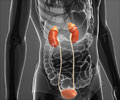Excessive salt and water retention mainly cause resistant hypertension which can be treated by using antihypertensive drugs and diuretic therapy.
- Excessive salt and water retention increase the risk of resistant hypertension
- Aldosterone, a steroid hormone causes salt retention in the bloodstream
- Antihypertensive drugs and diuretic therapy can be used to treat hypertension and to increase salt and water excretion by the kidneys
Aldosterone, a steroid hormone mainly causes salt to accumulate in the bloodstream which occurs even in patients who are on reasonable diets. Despite using diuretics and other standard treatments, there is an increase in the blood pressure.
Risks of Hypertension
High blood pressure (Hypertension) is an important preventable cause of heart attack, heart failure, stroke and premature death. It is very common and affects over 1 billion people across the world and estimates for about 10 million potentially avoidable deaths per year.
Resistant Hypertension
Hypertension can be easily treated by a slight modification in the lifestyle and use of regular medication whereas 1 in 10 patients have resistant hypertension, a condition causing difficulty in controlling the blood pressure thereby increasing the risk of stroke and heart disease.
The study provides the result from a six-year trial in 314 patients with resistant hypertension, observed by a team of researchers in the British Hypertension Society, funded by the British Heart Foundation and the National Institute for Health Research, and published in the journal The Lancet Diabetes & Endocrinology.
The results of this study will be effective in developing changes in the clinical practice across the world and also helps to control blood pressure and other outcomes of resistant hypertension in patients, said Professor Bryan Williams from University College London.
"It is remarkable when so many advances in medicine depend on expensive innovation, that we have been able to revisit the use of drugs developed over half a century ago and show that for this difficult-to-treat population of patients, they work really well,"said Professor Bryan William.
Use of Antihypertensive Drugs and Diuretics
The team of researchers highlighted that the drug spironolactone (a steroid blocker of aldosterone) reduced resistant hypertension than any other antihypertensive drugs, from a previous study. Therefore, in the present study, they were able to identify the superiority of spironolactone is mainly due to its ability to overcome the salt retention in the treatment of resistant hypertension.
The team of researchers also suggested that if patients are unable to tolerate spironolactone, they can be substituted by a drug, amiloride.
The research comes from the PATHWAY-2 study, designed to develop more effective ways of treating hypertension. The study hypothesis states that resistant hypertension is caused by excess salt and water retention and the high blood pressure in these patients can be treated with the help of diuretic therapy mainly to increase salt and water excretion by the kidneys.
Reference:
- Prof Bryan Williams, MD, Prof Morris J Brown, FMedSci, et al. Endocrine and haemodynamic changes in resistant hypertension, and blood pressure responses to spironolactone or amiloride: the PATHWAY-2 mechanisms substudies, The Lancet Diabetes & Endocrinology (2018)DOI: 10.1016/S2213-8587(18)30071-8
Source-Medindia
















